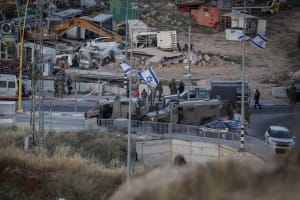Christian Arab singing for Israel on global stage inspires hope for all Israelis

“That an Arab should represent Israel on an international stage is a huge source of pride,” said Zohurha Abonar, a Muslim resident of Jaffa to JTA. “And the fact that she’s from right here? That makes it even more special.”
“She’s inspiring so many of us,” said her young cousin.
Arab singer Valerie Hamaty is an actress and singer who is leading the race to represent Israel in the next Eurovision Song Contest. Not only has she courageously chosen to sing for Israel before the world, but she has also taken time to bring comfort and hope to those in Israel by visiting injured soldiers, accepting invitations to sing at funerals and wearing a yellow pin in support of the hostages.
Yet, like Eden Golan, last year’s brave Eurovision contestant from Israel who had to deal with a wave of abuse during the competition, Hamaty is going to need tough skin. Not all voices have been so enthusiastic, and at this time of national crisis, her Arab-Christian identity has become a major talking point. So much so that Israeli-Lebanese writer Jonathan Elkhoury has publicly called for calm.
On the other hand, there has also been a lot of encouragement. Hamaty’s father proudly airs his daughter’s performances on loop in his pizzeria in Jaffa, and has been scanning the responses to his daughter in the media to assess the public’s reaction.
“The comments sections are tainted by a few very loud racists who answer everyone,” he said, “but the sane majority has shown nothing but love for Valerie.”
Hamaty hails from Jaffa, was educated in Tel Aviv and speaks five languages. Though expected to pursue a career in medicine, Hamaty decided to study music at the Rimon School of Jazz and Contemporary Music. Her talent for singing was picked up in high school, where she was chosen to sing at key events, such as Memorial Day ceremonies, and at a Knesset event when she was just 16 years old.
In 2021, she stepped into the spotlight when she took part in the eighth season of “Rising Star” and came second. The JTA reported that when she told her father Tony about her decision to enter the Eurovision, he assured her of his full support: “I told her if music is her dream, I’m behind her.”
As part of the competition to represent Israel, Hamaty performed a classic Israeli song, “When the Heart Cries,” with words from the Shema prayer, as well as Eden Golan’s song “Hurricane,” encapsulating Israel’s response to the horrors of the Oct. 7 terror attack, which she performed together with a survivor of the massacre.
Just as Lebanese Christian artist Carine Bassili discovered when she translated and sang Hurricane in Arabic, the response from Israelis to such comforting solidarity from the Arab community can be profound. For some, just the sound of Arabic can cause visceral negative reactions in the wake of the worst attack in Israel’s history, but for others, it provides a doorway to healing.
In an interview on Channel 12, Hamaty shared how Shani Goren, an Israeli hostage who was released from Hamas captivity in Gaza in November 2023, had contacted her to say how much she wanted to hear Hamaty sing in the Arabic language.
“I don’t want to associate it only with what I went through there,” she told Hamaty. “You’re the only one who can help me see it differently.”
Soothing songs in Arabic, it seems, have unique healing power for many who have been traumatized.
Hamaty responded, “If this is my mission, and these are the people who have given me their blessing, I have nothing left to prove. Music constantly amazes me – if Arabic triggers fear in some, singing transforms it, reaching their hearts in a different way,” she said.
Hamaty recently sang a duet with another contestant in the competition, Daniel Wais, who was forced to bury his parents from Kibbutz Be’eri, both killed by Hamas. Their bodies were moved from temporary graves to the kibbutz after it was deemed safe enough. It wasn’t long after the ceremony that Wais recorded a rendition of "Hurricane" with the Hamaty. Their version included lyrics from the original song, “October Rain,” which was deemed too political for Eurovision.
“When I realized we’d be singing together on ‘Rising Star,’ I got goosebumps,” said Wais. His father, Shmulik was murdered trying to defend his wife who was later kidnapped and killed in Gaza.
Wais revealed that, before his death, Shmulik had seen his son and Hamaty competing against each other back in 2021 and had urged him to “find a way to perform with her someday,” according to the Times of Israel.
After laying his parents to rest in their community right next to Gaza, Wais sang that duet with Hamaty, who stands in solidarity with him in his pain. Shmulik would surely be proud.

Jo Elizabeth has a great interest in politics and cultural developments, studying Social Policy for her first degree and gaining a Masters in Jewish Philosophy from Haifa University, but she loves to write about the Bible and its primary subject, the God of Israel. As a writer, Jo spends her time between the UK and Jerusalem, Israel.
You might also like to read this:
















